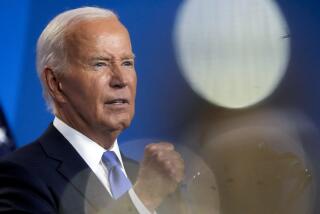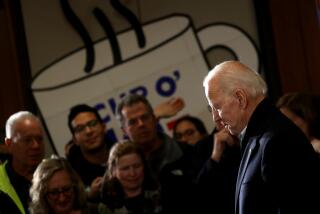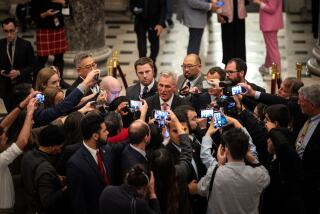Wary Circling by Buchanan, Dole Points to Risks for GOP
- Share via
DETROIT — Bob Dole’s campaign juggernaut and Patrick J. Buchanan’s sputtering crusade have entered the dangerous season, the thrust and parry of public feinting and back-channel gamesmanship that will either cement or dissolve their fragile political relationship.
With all their major rivals gone from the Republican presidential race, Dole and Buchanan are circling like locked scorpions in a familiar, awkward minuet that has wedded and scarred presidential primary combatants in both parties for almost two decades.
In 1980, conflict between then-President Carter and Sen. Edward M. Kennedy of Massachusetts divided the Democratic Party and helped sink Carter in November. The Rev. Jesse Jackson’s on-again, off-again rapprochement with Walter F. Mondale in 1984 and Michael S. Dukakis in 1988 wounded both nominees; in Dukakis’ case, it may have contributed to his general-election loss. And aides to then-President Bush ultimately regretted the prime-time convention speech they granted Buchanan four years ago in return for his thorny reconciliation with the incumbent.
This year, the stakes for Dole are clear: As he locks up the nomination, the Senate majority leader needs to bring Buchanan and his hard-right followers in line before the GOP’s August convention in San Diego.
But Buchanan continues to play hard to get even as his losses mount. Indeed, he and his aides have cranked up the volume of their demands in recent days, pressing Dole with threats of bolting to a third party.
In internal meetings, Buchanan’s staffers have laid plans to poll their 150,000 contributors in April on whether he should run as an independent this fall. And campaign manager Angela “Bay” Buchanan said her brother and his senior aides have discussed holding a rival San Diego conclave if Dole spurns the conservative commentator by barring him from a prominent role at the GOP convention.
“We could have our own convention down the street from theirs. We’ve spoken about it, and it’s an option,” Bay Buchanan said. Media coverage would be “amazing,” she added, laughing.
War of Nerves
As the war of nerves ratchets up in public, there has been little movement behind the scenes. According to both camps, a few paltry attempts at sending out peace feelers have quickly sputtered.
“There’s nothing out there,” said a senior GOP leader. “They both know exactly what they have to do to unify the party, and no one wants to take the first step.”
Buchanan has taken a cue from Jackson’s public negotiating tactics during the ’84 and ’88 Democratic primary campaigns, demanding “respect” for his populist movement by claiming that not only he but his campaign themes require attention from Dole.
At the very least, Bay Buchanan said last week, her brother expects another “prime-time slot” for a speech similar to his call to arms for a “cultural war” at the 1992 convention in Houston. In his stump speeches this winter, Buchanan has repeatedly referred to the speech nostalgically, deriding Democratic opponents and media commentators who have claimed it was a contributing factor in the Bush campaign’s disintegration.
Unlike in ‘92, when the Buchanan forces made only a fleeting effort to change the party’s platform, Buchanan now wants influence on the party’s direction along with the inclusion of his social conservatism and protectionist trade views.
Beyond forcing his campaign agenda into play at the convention, “I don’t want anything from” the Dole camp, Buchanan told The Times recently. “I’m not into government jobs.”
But he added acidly that if Republican leaders failed to make the party “broader and more robust” by bringing in his supporters, they would end up “in the back of the bus.”
Dole’s Dilemma
For Dole, the question is whether he even needs to coddle Buchanan--as Bush did in 1992--to win over his rival’s people.
Republican campaign veteran Robert M. Teeter, who has worked for Dole and managed Bush’s reelection effort in 1992, said that in a two-way race, most of Buchanan’s backers would automatically drift to Dole--negating the need for the Kansas senator to “go overboard” in wooing Buchanan into his fold.
Buchanan backers are “basically Republican and conservative, and Dole has already had success in cutting into [Buchanan’s] base,” Teeter said.
But another presidential bid by Texas businessman Ross Perot would force a closer working relationship to cement the party’s conservative base, he added.
In interviews, Dole has minimized Buchanan’s threat of a third-party run as a “suicide mission” that would end any possibility of the latter running again as a GOP presidential candidate. For the moment, Dole is content to string out his victories. Dealing with Buchanan can wait.
Shortly after Dole’s romp through the primaries began earlier this month, his campaign manager, Scott Reed, telephoned Bay Buchanan, asking that they “get together” to discuss the campaign.
“I’m not interested,” she replied.
Afterward, she said she would accept calls only from New Hampshire Gov. Steve Merrill. As an intermediary, Buchanan aides consider Merrill preferable to Reed, who is blamed for the Dole campaign’s attacks on Buchanan as an “extremist.”
During a chance meeting Friday night in a Troy, Mich., hotel lobby, Christian Coalition Executive Director Ralph Reed pressed several Buchanan aides about the candidate’s intentions. “Pat’s going to endorse, isn’t he?” Reed asked the aides. The aides replied that their candidate was keeping his options open, but on Saturday morning Buchanan insisted that there were “no back channels” to the Dole camp.
Most of Dole’s top aides have cautioned the Kansan to hang tough in his dealings with Buchanan. In their view, Buchanan has generated less of a groundswell this year than in 1992. Dole, meanwhile, has cut into Buchanan’s base, winning increasingly among social conservatives and Southerners.
“It’s less of a movement this time,” said David Carney, a Dole senior advisor who worked as a political aide to Bush. “There’s no incumbent president to run against, and he’s less of a protest candidate.”
Still, Dole must walk a fine line; too tough a stance with Buchanan could cause problems in San Diego.
“A convention in chaos tells voters that a candidate is not in charge,” said Ronald Walters, a Howard University political scientist and former Jackson aide. “It makes them wonder if he can be a strong president. You can always throw a few bones to the loser in the privacy of negotiations and gloss over it the next day. You can’t gloss over a disaster of a convention.”
Several Bush campaign veterans who negotiated face to face with Buchanan in 1992 now say they were too quick to give in to him. Dole should be less accommodating, they say.
“If you’re in a position of strength with Pat Buchanan, use it,” Teeter said. “It’s not worth it to make a deal with him.”
After nipping at Bush’s heels in the Republican primaries in 1992, Buchanan agreed to endorse him in return for being given a prime-time convention speech. Former Bush aides call that move a mistake and say that Buchanan’s tirade against liberals threw the campaign off course.
Controversy From ’92
There is still a war of words over a brief meeting in Washington between Buchanan and his sister and a group of Bush aides several weeks before the ’92 convention. The session--attended by Teeter, convention manager Craig Fuller, political consultant James Lake and advisor Charles Black--lasted barely half an hour.
The participants agree only on the broad outlines of the understanding reached. Buchanan pledged to endorse Bush at the convention and provide an advance copy of his speech to Bush, but he refused to cede editorial control of its content.
Teeter says the copy arrived, but only on the day the speech was delivered, not several days earlier, as he insists Buchanan promised.
Bay Buchanan recalls that Bush aides were “all smiles” after they looked over the speech. “They gave us double thumbs-up after they read it,” she said.
Former Bush White House Chief of Staff Samuel K. Skinner said he and other aides were so focused on securing Buchanan’s endorsement that they failed to realize the provocative power of his words.
“It set the wrong tone from the start,” Skinner said. “If Dole wants to leave his own impression at the convention, Buchanan should not have a strong role.”
Among those at the ’92 meeting, only Black, a longtime Buchanan friend, maintains that “it would be a mistake to ignore Pat. He needs to be treated like a loyal Republican.”
Democratic campaign veterans who won their stripes in the bloody sessions between Carter and Kennedy and the negotiations between Jackson and Mondale and, four years later, Dukakis, largely agree with Black. And whether they were Kennedy rebels, Jackson disciples or mainstream party pros, almost all say Dole would be wise to deal with Buchanan earlier rather than later.
Aside from their obvious partisan glee in the GOP’s dilemma, the Democratic strategists argue that by playing tough, Dole would be sowing the seeds of defeat.
Former Jackson aide Walters says Dole needs to make accommodations with Buchanan--and quickly. “This is the most crucial period. They wait too long to bring him in, they could blow the whole deal,” he said.
Political analyst Robert G. Beckel, who fronted for Mondale in the talks with Jackson, agreed that “it would be smart to negotiate early. [Dole] has to open the lines of communication in the spring, before Buchanan cold-shoulders him completely.”
One Democratic stalwart said both Mondale and Dukakis tried at times to “tough it out” with Jackson, which caused Jackson and his aides to waver. “Negotiating with Jesse was like negotiating with Jell-O,” the Democratic veteran said.
The Kennedy-Carter debacle remains the worst-case scenario, which Democrats warn could be repeated if Dole and Buchanan both refuse to give ground.
“Just because you are finally negotiating doesn’t mean you avoid disaster,” said former Dukakis campaign manager Susan Estrich, who was on Kennedy’s platform-negotiating team. Kennedy aides tried to win points on 44 planks in the party platform; when Carter’s staff shot them down, Kennedy took his fight to the convention floor.
“We tried our best at being accommodating,” said former Carter aide Jody Powell. “A lot of what [Kennedy] asked us would have impacted negatively on the race with [Ronald] Reagan.”
“The Kennedy-Carter fight got out of control because the Carter people felt it was important for them to be seen as giving no quarter,” Estrich countered. “Sound familiar?”
Times staff writer Sam Fulwood III and researcher John Beckham contributed to this story.
More to Read
Get the L.A. Times Politics newsletter
Deeply reported insights into legislation, politics and policy from Sacramento, Washington and beyond. In your inbox twice per week.
You may occasionally receive promotional content from the Los Angeles Times.










